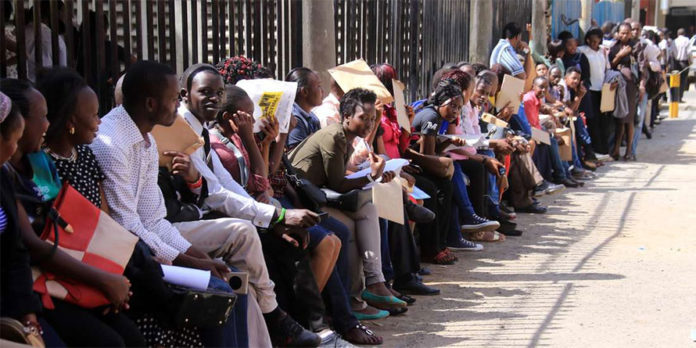By Isaac Akeyo, National DevReporter

Unemployment is a significant problem Kenyans have faced since independence. The dream of living a good and dignified life has been a nightmare to many, more especially the youth.
The 2019 national census data indicate that over 5 million qualified young people in Kenya are jobless, and the number is likely higher at the moment. It has become extremely hard to secure formal jobs in the country and many university graduates have opted for other alternatives to survive.
Mark Josiah Otieno, who graduated with a degree in Economics and Statistics from the University of Nairobi in 2020, says getting a job has been a nightmare for him.
“I tried to look for opportunities, but none was coming through. So, I decided to do something different. I started doing clinical research projects to at least earn a living,” he stated.
The situation is no different for Beryl Verah, a graduate of Karatina University who lives in Nairobi. After graduating with a degree in Business Management and Administration, she has not been lucky to get a formal job despite doing several unpaid internships.
“Getting a job is not easy. I did some unpaid internships hoping to be absorbed but that did not happen. At that point I was convinced that life must continue even without a formal job. So, I started a shoe and clothing business to survive, and yes, I am surviving,” she stated.
What is Government Doing?
According to Treasury CS Ukur Yatani, the government has allocated money for youth empowerment, enhanced liquidity for business and extended financial support to youth activities, as well as allocated money to the Youth Enterprise Development Fund and Women Empowerment Fund to support youth and women in business.
Yatani says that the government allocated Ksh 2.1 billion in the 2022 national budget for youth empowerment and job creation through the Kazi Mtaani Program. Another Ksh 1.6 billion was allocated for enhancing liquidity for business, according to Yatani.
He adds that some Ksh 5.8 billion was to support activities that would create employment for the youth. For example, construction of classrooms where young people will get opportunities to supply products such as construction materials, provide labour required for building the classrooms and for making school desks.
In Other Countries
Other countries have introduced grants and mentorship programmes, growth incentive schemes and supported farmers to boost productivity in order to solve the problem of unemployment.
In Singapore, the government launched the Startup SG Founder program in 2017 to provide mentorship and grants to new entrepreneurs. According to a report by Osborne Clarke, some 74 start-ups received mentorship and grants amounting to US$ 2.22 million in 2019.
Singapore also introduced the Job Growth Incentive (JGI) scheme to support companies to hire local employees by providing wage support to them.
The United Kingdom (UK) government launched the Farming Investment Fund to provide farmers with grants to buy new equipment and infrastructure to improve efficiency and increase productivity.
Following the success of the above strategies in the respective countries, the government of Kenya should design appropriate approaches to help more young people find jobs. The issue of high rate of youth unemployment in Kenya is a ticking time bomb.






